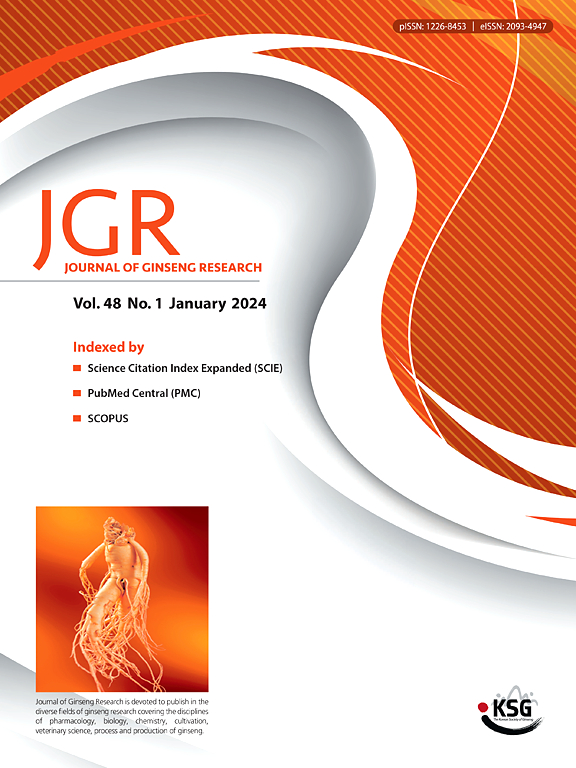Ginsenoside Rg2, a principal effective ingredient of Panax ginseng, attenuates DSS-induced ulcerative colitis through NF-κB/NLRP3 pathway
IF 6.8
2区 医学
Q1 CHEMISTRY, MEDICINAL
引用次数: 0
Abstract
Background
Ginsenoside Rg2 (G-Rg2), a major active compound of Panax ginseng, exhibits a wide range of pharmacological properties, including anticancer, antioxidant and neuroprotective effects. However, the mechanisms by which G-Rg2 mitigates ulcerative colitis (UC) have not been clearly elucidated.
Aims
In the present study, we aimed to elucidate the underlying mechanisms by which G-Rg2 mitigated UC.
Methods
In this study, we investigated the efficacy of G-Rg2 in ameliorating dextran sulfate sodium (DSS)-induced UC and its potential mechanisms using a DSS-induced UC mouse model and Lipopolysaccharides (LPS)/nigericin (Nig)-induced NOD-, LRR- and pyrin domain-containing protein 3 (NLRP3) inflammasome activation on immortalized bone marrow-derived macrophages (iBMDMs).
Results
Oral administration of G-Rg2 at doses of 10 and 20 mg/kg significantly mitigated weight loss, normalized food and water intake, and improved colon histopathology in DSS-induced UC mice. G-Rg2 also restored mRNA expression levels of occludin, claudin-3, zona occluden (ZO)-1 and mucin 2, thereby enhancing intestinal barrier integrity. G-Rg2 significantly suppressed the nuclear translocation of p65, the subunit of nuclear factor kappa-B (NF-κB), as well as downregulated NLRP3, cleaved IL-1β and caspase1 p20 expression induced by LPS/Nig in iBMDMs.
Conclusion
G-Rg2 effectively reduced colon inflammation in DSS-induced UC mice and diminishes inflammatory responses under LPS/Nig conditions by regulating NF-κB/NLRP3 pathway, thereby inhibiting NLRP3 inflammasome activation, which may serve as a potent therapeutic agent for UC.

人参皂苷Rg2是人参的主要有效成分,通过NF-κB/NLRP3途径减轻dss诱导的溃疡性结肠炎
人参皂苷Rg2 (G-Rg2)是人参的一种主要活性化合物,具有抗癌、抗氧化和神经保护等多种药理作用。然而,G-Rg2减轻溃疡性结肠炎(UC)的机制尚未明确阐明。目的在本研究中,我们旨在阐明G-Rg2减轻UC的潜在机制。方法在本研究中,我们通过DSS诱导的UC小鼠模型和脂多糖(LPS)/奈及利菌素(Nig)诱导的NOD-、LRR-和pyrin结构域蛋白3 (NLRP3)炎性体对永生化骨髓源性巨噬细胞(iBMDMs)的激活,研究G-Rg2对DSS诱导UC的改善作用及其潜在机制。结果10和20 mg/kg剂量的G-Rg2可显著减轻dss诱导UC小鼠的体重,使食物和水的摄入正常化,并改善结肠组织病理学。G-Rg2还能恢复occludin、claudin-3、occluden (ZO)-1和mucin 2 mRNA的表达水平,从而增强肠屏障的完整性。G-Rg2显著抑制核因子κ b (NF-κB)亚基p65的核易位,下调LPS/Nig诱导的iBMDMs中NLRP3、裂解IL-1β和caspase1 p20的表达。结论- rg2通过调节NF-κB/NLRP3通路,抑制NLRP3炎性小体的激活,可有效减轻dss诱导UC小鼠的结肠炎症,降低LPS/Nig条件下的炎症反应,可能是UC的有效治疗药物。
本文章由计算机程序翻译,如有差异,请以英文原文为准。
求助全文
约1分钟内获得全文
求助全文
来源期刊

Journal of Ginseng Research
CHEMISTRY, MEDICINAL-INTEGRATIVE & COMPLEMENTARY MEDICINE
CiteScore
11.40
自引率
9.50%
发文量
111
审稿时长
6-12 weeks
期刊介绍:
Journal of Ginseng Research (JGR) is an official, open access journal of the Korean Society of Ginseng and is the only international journal publishing scholarly reports on ginseng research in the world. The journal is a bimonthly peer-reviewed publication featuring high-quality studies related to basic, pre-clinical, and clinical researches on ginseng to reflect recent progresses in ginseng research.
JGR publishes papers, either experimental or theoretical, that advance our understanding of ginseng science, including plant sciences, biology, chemistry, pharmacology, toxicology, pharmacokinetics, veterinary medicine, biochemistry, manufacture, and clinical study of ginseng since 1976. It also includes the new paradigm of integrative research, covering alternative medicinal approaches. Article types considered for publication include review articles, original research articles, and brief reports.
JGR helps researchers to understand mechanisms for traditional efficacy of ginseng and to put their clinical evidence together. It provides balanced information on basic science and clinical applications to researchers, manufacturers, practitioners, teachers, scholars, and medical doctors.
 求助内容:
求助内容: 应助结果提醒方式:
应助结果提醒方式:


